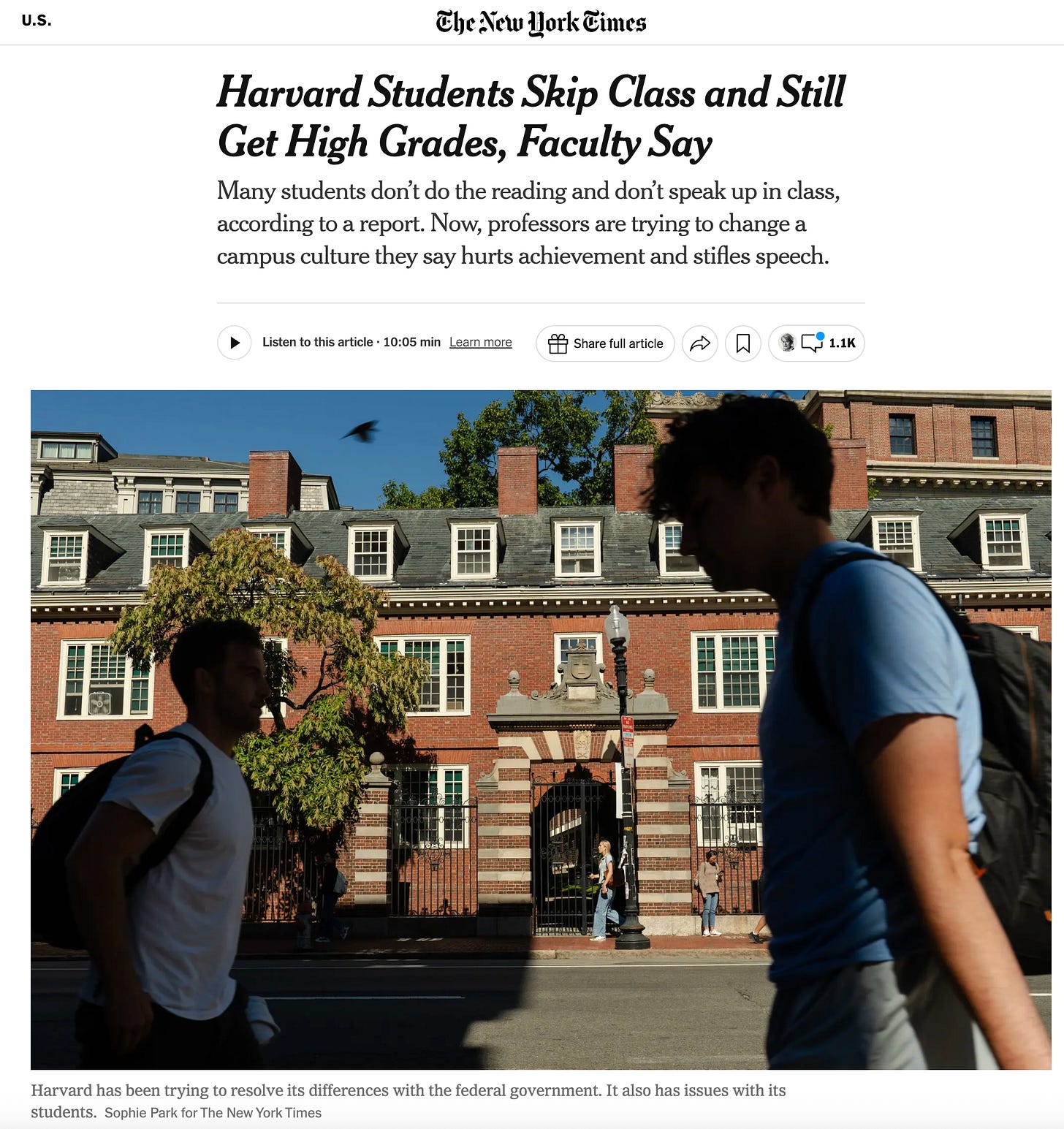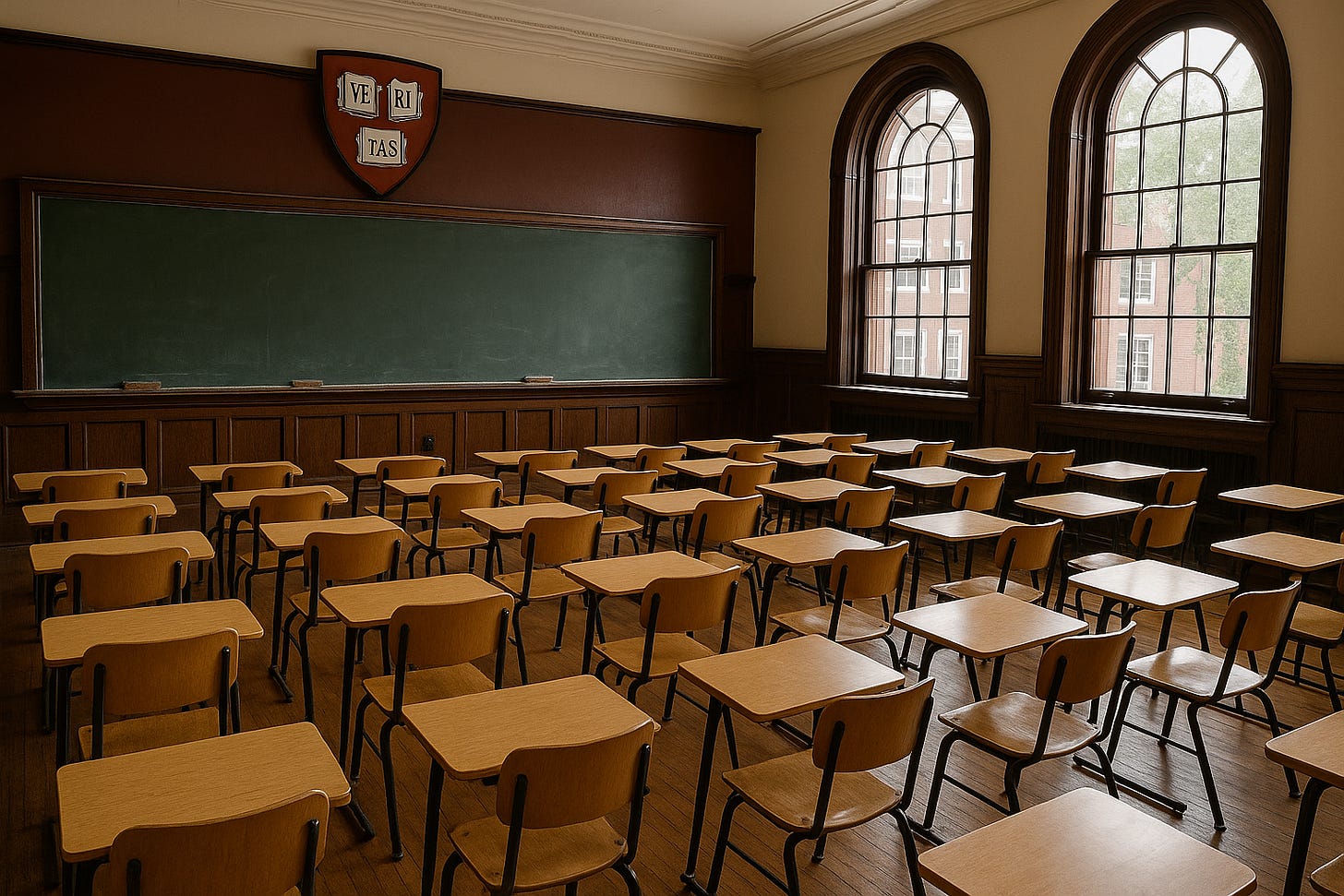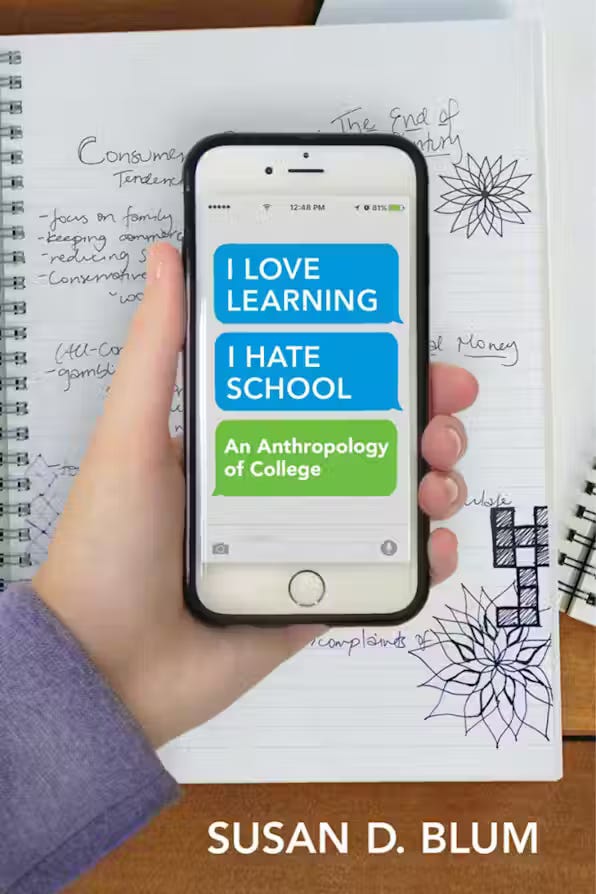What's Going On at Harvard?
The crisis of confidence that's emptying classrooms -- and what it means for higher-ed.
Higher ed faces a crisis of confidence. It takes many guises — A.I. and cheating, free speech and self-censorship, the lack of virtue-forming educational experiences — but neither the problem nor its solution can be reduced to any one of these. Still, a recent New York Times exposé on absenteeism and grade inflation at Harvard reads like a stunning, unguarded admission: students have largely abandoned the classroom as a site of meaningful learning, and professors and administrators have barely begun to acknowledge the problem. Harvard, here, can be read as a synecdoche for elite educational institutions more broadly. My hope is that the candor of this self-assessment inspires others to take a similarly hard look at what is (and isn’t) happening in their classrooms.

Quiet Revelations in a Committee Report on Teaching
According to a recent New York Times Article, summing up a report written by seven of its own faculty, “…many [Harvard] students skip class and fail to do the reading.”
When they do show up for class, they are focused on their devices, and are reluctant to speak out. Sometimes it is because they are afraid of sharing ideas that others will disagree with. But often, they have not read enough of the homework to make a meaningful contribution, the report continued.
Rampant grade inflation allows them to coast through anyway, it concluded. [Which means that] many students graduate without having benefited from talking very much with their teachers and peers, and they stay stuck in ideological bubbles, unwilling or unable to engage with challenging ideas.”
Rarely in my time teaching in or writing about higher-ed has such an unvarnished picture of our challenges emerged. Nor have I found anyone to be as transparent or blunt as this committee in articulating the elements of the crisis we’re dealing with. Here are just some of the truly surreal things reported in this piece:
Around 60% of the grades given at Harvard are As (up from 40% in 2015).
Despite worries about absenteeism, students at Harvard are permitted to enroll in two courses that meet at the same time. (One professor is quoted as defending this policy because prohibiting it “would give students heartburn.”)
“Many Harvard College students do not prioritize their courses and some view extensive extracurricular commitments as a more fulfilling, meaningful, and useful allocation of their time.”
Almost as surreal as the things reported is Harvard’s response. The Dean of the faculty of arts and sciences acknowledges that the report contains “hard truths about our learning culture.” The article reports that, in response, “Harvard and its professors have been trying to shift the undergraduate experience this fall, to turn its students into more open-minded and academically engaged people.” As an example of this response?
Some instructors now take attendance.
Let me pause at this point to say: I’m deeply grateful for the candor. I’m impressed that Harvard summoned the will to engage in this kind of self-reflection by commissioning the report, and equally impressed by the transparency of the faculty’s findings. The whole article, though, has an almost absurd quality to it. It’s almost as though the only thing allowing us to report on these things so openly is the sense that we won’t be held to account, and that there’s really not much we can do to combat it anyway.
“Class is my lowest priority…”
Earlier this semester, I encountered something in office hours that felt both new and somehow portentous. A student signed up for office hours to argue that my attendance policy was far too strict. I give students two “free” unexcused absences, and make it abundantly clear how they can receive excused absences for things mandated by the university (illness, mandatory departmental exams, job interviews). But I make it very clear that I expect them to attend and participate (I collect small comprehension assignments in every class), and that these are absolute, minimal, non-negotiable requirements. The student listed activities, clubs, volunteer opportunities, and a number of other things competing for their time. I empathized — I wouldn’t want to be that busy — but also pushed back: taking core classes is an essential part of receiving a college education, many of these other activities are valuable but optional. If you can’t balance college clubs with college courses, it seems clear to me what has to give. But the student was unmoved. “I enjoy your class, I think the expectations are fair, I’m learning a lot about philosophy,” he said. “But class is my lowest priority.”
Of course, this stung a bit, and I said so. But I was also more bemused and curious than offended. I tried, unsuccessfully, to get myself in the headspace in the moment. If taking classes is one’s lowest priority at college, then what does one think college is about? We reached an amicable resolution — I told him he’d fail if he didn’t show up to class, and he hasn’t missed a session — but the exchange has stuck with me. How to make sense of this attitude, which I think is by no means unique to this particular student? How to interpret his experience charitably? What does it suggest about where students think the real learning is happening?
“To Think What We Are Doing”
I think we need to take a step back, both from the stunning revelations of the report and from the particular exchanges that might make its findings feel unchangeable. As I’ve argued in another post and in a different context, students increasingly fail to see the college classroom as a site of meaningful learning. We’ve long known that very few students do required readings (studies, like this one, put the number at about 20-30%). Anyone who has taught in a college setting in the last 20 years knows that attention and engagement have declined as absenteeism and distraction have increased. But this is yet another opportunity to ask why. Why is it that students, even those who love learning, really don’t like school?
I have my own theories, which I often go into here on Substack and in talks that I give. But it’s worth hearing our students articulate the reasons, and seeing how our practices (multiplying majors, for instance, or thinking uncritically about curves/differentiation) might be contributing to it. From the article:
Students are left having to find other ways to distinguish themselves, like joining more clubs, taking more courses or having two fields of concentration instead of just one…
The competition for internships and, eventually, jobs in fields like law and finance can be ferocious, they say. So they have no choice but to invest significant amounts of time in clubs that will show off their interests and skills, and differentiate them from all the other Harvard students who are getting A’s.
And they had to master the art of doing it all long before they were accepted to Harvard, they say: It’s what got them in.
Like the student I encountered in office hours, learning — in the classroom — often just isn’t seen as a priority. While some of this might be attributable to “young people these days” and their confounded attitudes, I think we as educators need to do so much more to understand and articulate the roots of this crisis, and then even more to respond in the way we design and deliver our classes.
All this to say: I got there, I understand where my student is coming from. And I’m grateful to this committee at Harvard for looking the problem in the face (and making the report publicly available). But I don’t want the significance (or the sheer incomprehensibility) of these findings to obscure the fundamental point: Students at elite universities do not see college classrooms as sites of meaningful learning, and this is an absolutely existential problem for those of us who teach in them.




If you’re at Harvard you’re a climber that follows incentives which is exactly what these students are doing and you can’t stop the revolution in the 1970s or whenever liberal boomers are comfortable. All this was bound to happen once Harvard switched their educational model from classical liberal education to the modern job training model in the late 19th century. It’s just like how transgenderism was bound to happen once you deny the teleological aspect of sex and you can’t just stop at LGB.